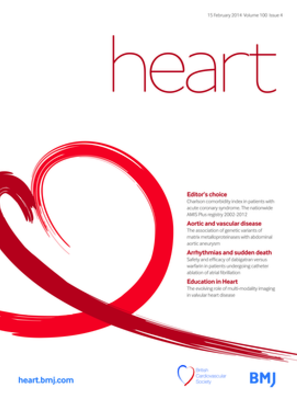优化心脏植入式电子设备的远程监控:英国德尔菲共识
IF 5.1
2区 医学
Q1 CARDIAC & CARDIOVASCULAR SYSTEMS
引用次数: 0
摘要
背景 远程监护(RM)被推荐用于心脏植入式电子设备(CIED)患者的持续管理。尽管远程监护有很多好处,但它的采用增加了心律管理团队的工作量。本研究采用改良德尔菲法就英国 CIED 成年患者的最佳 RM 管理达成共识。方法 由心脏生理学家、心脏病专家、专科护士、专业支持人员和患者代表组成的国家指导委员会制定了 114 份关于最佳 RM 实践的声明,涵盖能力、支持、服务提供、协调和临床升级等方面。采用在线问卷调查的方式收集英国专家的意见,达成共识的比例≥75%。结果 在 2023 年 10 月 16 日至 2023 年 12 月 4 日期间,共收到 115 份回复。其中,79 份(69%)达到高度一致(≥90%),20 份(18%)达到中度一致(75%-89%),15 份(13%)未达成共识。达成一致意见最多的是患者教育和支持,最少的是工作量分配。结论 英国医疗保健专业人员对 CIED 的最佳 RM 实践有很强的共识。主要建议包括确保患者就诊、提供充足的资源、采用新的工作方法、加强患者教育、建立明确的临床升级路径以及规范国家政策。根据当地能力实施这些最佳实践,对于在全英范围内提供有效、公平的RM服务至关重要。如有合理要求,可提供相关数据。与研究相关的所有数据均包含在文章中或作为在线补充信息上传。本文章由计算机程序翻译,如有差异,请以英文原文为准。
Optimising remote monitoring for cardiac implantable electronic devices: a UK Delphi consensus
Background Remote monitoring (RM) is recommended for the ongoing management of patients with cardiac implantable electronic devices (CIEDs). Despite its benefits, RM adoption has increased the workload for cardiac rhythm management teams. This study used a modified Delphi method to develop a consensus on optimal RM management for adult patients with a CIED in the UK. Methods A national steering committee comprising cardiac physiologists, cardiologists, specialist nurses, support professionals and a patient representative developed 114 statements on best RM practices, covering capacity, support, service delivery, coordination and clinical escalation. An online questionnaire was used to gather input from UK specialists, with consensus defined as ≥75% agreement. Results Between 16 October 2023 and 4 December 2023, 115 responses were received. Of the statements, 79 (69%) achieved high agreement (≥90%), 20 (18%) showed moderate agreement (75%–89%) and 15 (13%) did not achieve consensus. The highest agreement focused on patient education and support, while the lowest concerned workload distribution. Conclusions There is strong agreement on best practices for RM of CIEDs among UK healthcare professionals. Key recommendations include ensuring patient access, providing adequate resources, adopting new working methods, enhancing patient education, establishing clear clinical escalation pathways and standardising national policies. Implementing these best practices, tailored to local capabilities, is essential for effective and equitable RM services across the UK. Data are available on reasonable request. All data relevant to the study are included in the article or uploaded as online supplemental information.
求助全文
通过发布文献求助,成功后即可免费获取论文全文。
去求助
来源期刊

Heart
医学-心血管系统
CiteScore
10.30
自引率
5.30%
发文量
320
审稿时长
3-6 weeks
期刊介绍:
Heart is an international peer reviewed journal that keeps cardiologists up to date with important research advances in cardiovascular disease. New scientific developments are highlighted in editorials and put in context with concise review articles. There is one free Editor’s Choice article in each issue, with open access options available to authors for all articles. Education in Heart articles provide a comprehensive, continuously updated, cardiology curriculum.
 求助内容:
求助内容: 应助结果提醒方式:
应助结果提醒方式:


